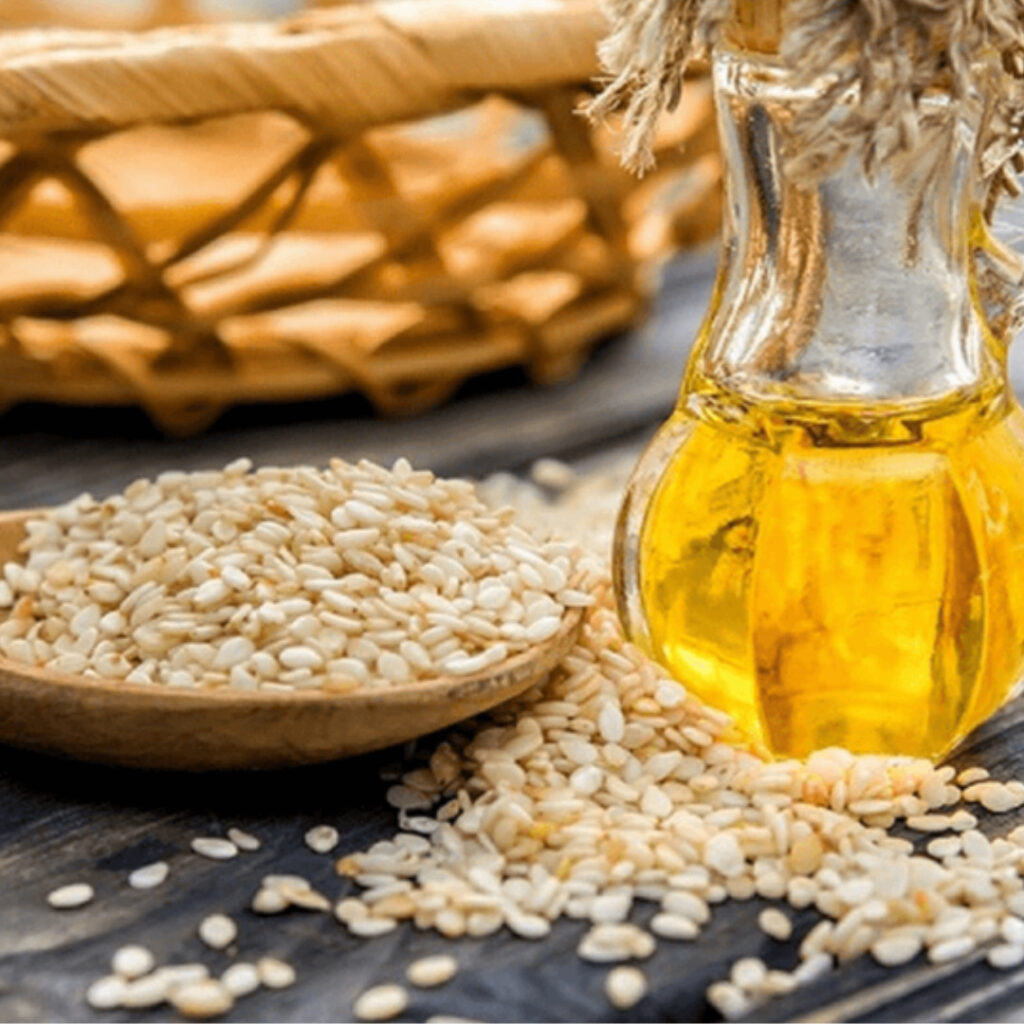Sesame seed is primarily grown in Asia and Africa’s tropical and subtropical regions. Sesame has a wide range of applications, ranging from direct consumption as food to an ingredient in cosmetic and pharmaceutical products. It has the highest oil content and a rich nutty flavour, making it a popular ingredient in cuisines worldwide.
Sesame seeds are a typical import product that is indispensable for the bakery sector and ethnic foods across the world. The mainstreaming of these ethnic foods and the increasing interest in vegan food are lately contributing to a growing demand for sesame seeds & its derivative products.
Industry-wise usage of Sesame Seeds

• The whole sesame seeds are used for topping on bakery products and food preparations such as snacks, crackers, confectionery (sweets), and salads (dressing and sauces). Ethnic cuisine products like
Tahini, Hummus, Sushi, Halva, and Asian confectionery have sesame seeds as a significant Ingredient.
• The Sesame seeds oil has wide acceptance in the food industry. The global sesame oil market is anticipated to expand at a value CAGR of around 5.5 percent over the 2021-2031 forecast period to reach a valuation of US$ 10.7 Bn. Sesame oil consumption steadily rises worldwide due to shifting consumer habits and increasing health consciousness. Consumers nowadays favour products with high nutritional value.
• The increase in Sesame seed consumption can also be seen due to its increasing application in the Pharmaceutical, Cosmetics, and Skincare industry.
• Sesame oil and its derived ingredients are widely used in the skincare industry.
• Sesame oil is used in Far East Asian cuisines as a cooking oil. Due to its high nutritional values, cold press sesame oil is accepted in the post COVID scenario.
Traditional Sesame Seeds Applications across the Global Markets:
• Europe and North America: Topping, bakery, and ingredients for snacks & vegan packaged foods.
• South Korea: Oil extraction is mainly a flavour enhancer rather than essential cooking oil.
• China: Oil extraction mainly as a flavour enhancer, Sesame paste, Bakery, and ingredient for snacks.
• Japan: Oil extraction and as edible grade (Hulled, Roasted and Sesame seeds paste)
• Other than the above major consuming markets, there are other markets where sesame seeds are
used as a functional ingredient in the food industry.
Paradigm shift in the Sesame Consumption Pattern:

• The popularity of these wonder seeds has increased significantly over the recent past, with product launches, as consumers are more inclined towards natural and wholesome ingredients. The market is driven by consumer preference towards functional and health-based naturally derived products.
• The COVID-19 pandemic compelled the consumers to rethink their consumption patterns, which has led to the growth in demand for healthy ingredients, and also created an opportunity for sesame
seeds as an ingredient to various food and personal care products.
• Across the world, there is a growing appetite for healthy ingredients in diets among consumers, especially the millennial population across North America and Europe.
• Sesame Seeds tap into many current market trends, from a clean label, natural and minimally processed, to free form and high protein. They are sustainable & align well with the mounting demand
for vegan and vegetarian products, especially in European countries.
• Cereal bars, like Sesame Honey Energy Bars, are in high demand in Europe. Innovative snack options, like the ready-to-use (organic) tahini, with black sesame and sesame milk, are also expected to boost the market for sesame seeds.
• The nutritional profile of these seeds has gained consumer attraction over the last few years. Despite the recently strong fluctuation in value, positive growth is visible over a more extended period. This provides opportunities for sesame in new products, but it also confirms an increasing consumption of foreign ethnic products with sesame such as tahini, hummus, and sushi.
Market Opportunities:

The sectors in which sesame consumption is expected to increase may be identified as below:
• Based on its application, the global sesame oil market is segmented into three main segments food,
cosmetics, and dietary supplement.
• Lately, it has been observed that demand for healthy oils in Europe is increasing at a much larger pace and sesame oil is at the forefront due to its high nutritional value. This increase in consumption is backed by sesame oil in salad dressings and is often marketed as high-quality oil.
• The plant-based protein market is expected to grow at a CAGR of 9.5 percent from 2020- 2027 to reach USD 21.23 Bn.
• The COVID- 19 situation has given a significant boost to the demand for plant-based products, which proved beneficial for all stakeholders in the plant-based protein market.
• With increased consumer preference for plant-based protein, sesame seeds are expected to play an important role. Already, the sesame seed beverage “sesame milk” is penetrating into the market and
gaining acceptance.
• Sesame seed is immerging as a crucial plant-based protein source. Sesame meal and sesame flour
have high protein content, and it has been recommended as a protein supplement along with soya
and legume proteins.
• Sesame flour usage is increasing for preparations of bread, protein biscuits, and in formulating high protein beverages.
• Sesame Seeds paste/butter (Tahini) is gaining popularity and is anticipated to exhibit the highest CAGR of 4.8 percent from 2022 to 2025.
• The mainstreaming of ethnic foods like- Tahini, Sesame halva, Hummus, etc., and the increasing interest in vegan food contributes to a growing demand for sesame. Germany and Greece are currently the largest markets, but there is also potential for growth in Poland, France, and Italy.
• In countries like China and Japan, an increase in trend can be noticed amongst consumers to use Sesame oil for culinary applications.
• Growing awareness of the benefits of sesame oil in skin and hair products and increased acceptance of sesame oil in various cosmetics items will likely propel the global market forward over the coming years.
• Premium cosmetic industry, where demand is skyrocketing, sesame seeds oil is preferred.
Gleanings:
• Sesame seeds are highly nutritional and flexible in terms of applications.
• It is a high-quality plant-based protein source available at a reasonable price.
• As the consumer preferences are shifting towards functional and health-based naturally derived products, this is the right time that all the stakeholders should play their respective roles in marketing and creating awareness about sesame seed’s health benefits and their wide applications in the food industry.
• With a lot of ongoing research about sesame seeds and their applications in the food industry, there is no doubt that in the coming time, many value-added products of sesame seeds will be available in the market to cater to consumer eating habits, increasing sesame seeds consumption.



